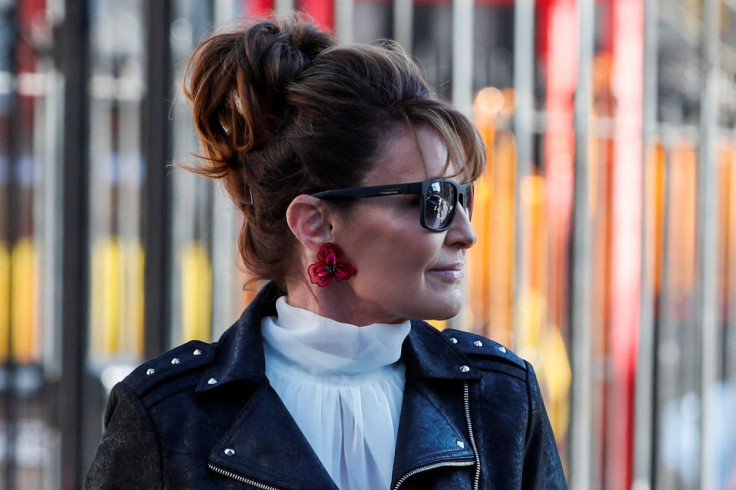Analysis-Palin's Legal Fight With The New York Times Is Far From Over

A surprising and unusual ruling against Sarah Palin in her defamation case against the New York Times has narrowed the former Alaska governor's route to victory but the high-profile suit is far from over, legal experts said.
In an abrupt twist in a trial seen as a test of longstanding protections for American media, U.S. District Judge Jed Rakoff on Monday announced plans to throw out the lawsuit - even as jurors were still deliberating. The judge did not inform the jurors of his plan.
Rakoff said Palin, the 2008 Republican U.S. vice presidential candidate who for years has been a leading conservative political figure, had failed to prove the Times defamed her in a 2017 editorial that erroneously linked her political rhetoric to a mass shooting.
The judge allowed jurors to keep deliberating as he announced his plans from the bench and said he would enter a formal dismissal only after they reached their own verdict.
Media law experts said it is not unprecedented for judges to issue so-called directed verdicts in defamation cases but called the timing of Rakoff's announcement highly unusual.
The U.S. Supreme Court has said that, given the importance of protecting freedom of the press, it can be appropriate for judges to take defamation cases out of the hands of jurors, said David Logan, a law professor at Roger Williams University in Rhode Island.
Logan said this procedural rule was created by New York Times v. Sullivan, a landmark 1964 Supreme Court ruling known for ushering in the "actual malice" standard for public figures to prove defamation.
In that decision, the Supreme Court held that the U.S. Constitution requires a reviewing court to independently examine the facts in a defamation case for itself to determine that a jury verdict does not amount to "a forbidden intrusion on the field of free expression."
"The trial judge has an independent role to play in evaluating actual malice," Logan said.
"Actual malice" required a showing that the Times knew its editorial was false or had reckless disregard for the truth.
It has been more common for a judge to issue a directed verdict either before jurors begin deliberations or after they have reached a verdict.
"The dispute isn't about what he (Rakoff) is doing," said Alexandra Lahav, a University of Connecticut law professor. "It is that he communicated his thinking at this stage of the case."
Rakoff said while the Times had engaged in "unfortunate editorializing," the newspaper did not act with "actual malice."
The judge added that the jury verdict could still help the parties and the appellate courts resolve the case.
The New York Times will be in a stronger position if the jury also rules in its favor, said Eric David, a media lawyer at the firm Brooks Pierce. In general, appeals courts are reluctant to second-guess factual determinations by jurors, David said.
"A jury verdict for the New York Times would be much more appeal-proof than a directed verdict," David said.
APPEAL SCENARIOS
If the jury rules in favor of Palin, the case would become more complicated. If Palin appeals as expected, the New York-based 2nd U.S. Circuit Court of Appeals would then review Rakoff's directed verdict and decide whether it agrees with him that she failed to prove "actual malice." If not, it could reinstate the jury verdict.
Palin is expected to argue on appeal that she presented strong evidence of "actual malice," but in any event the "actual malice" standard needs to be revisited by the U.S. Supreme Court.
Conservative Supreme Court Justices Clarence Thomas and Neil Gorsuch last year wrote dissenting opinions making clear they think the "actual malice" framework is outdated, but it is unclear if other justices would join them. The Supreme Court has a 6-3 conservative majority.
While the timing of Rakoff's directed verdict was unusual, Lahav said there was a certain efficiency to it given that jurors took time out of their lives to hear the case and lawyers were paid a lot of money to argue it.
"You don't want all those costs to go to waste," Lahav said, adding that it is worthwhile to "make sure the jury verdict is preserved so they don't have to do it all again."
One potential issue with Rakoff's approach that Palin's lawyers could raise on appeal is that there is a risk of jurors learning Rakoff's views on the case, said Benjamin Zipursky, a law professor at Fordham University in New York.
The jurors have been instructed to not read about the case when they go home at night. But in the digital era it can be difficult to avoid news reports and social media posts about a high-profile trial, Zipursky said.
© Copyright Thomson Reuters 2024. All rights reserved.





















